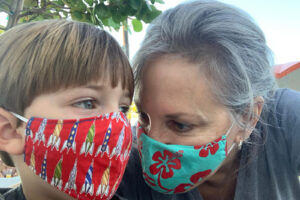“Cancer isn’t just one disease, and so the way we treat it can’t be one-size-fits-all,” says Hannah Carter, Ph.D.
Carter, a UC San Diego School of Medicine associate professor, shared this revelation in a press release detailing a recent study she co-authored on the inefficacy of immunotherapy on young, female oncology patients. Published in August 2020 in Nature Communications, the study looked at the genomic information of approximately 10,000 subjects with cancer. Researchers discovered that compared to older male subjects, young female subjects tend to have stronger immunoediting capabilities that MHCs, or major histocompatibility complexes, can’t address as efficiently.
MHCs are groups of genes that code for proteins on cells’ surfaces and help the immune system recognize foreign substances, like cancer. Through identifying proteins as “self” or “other,” MHCs are able to signal an appropriate immune response. Warriors who are young and female typically have strong immune systems, meaning their MHCs are fairly adept at ridding the body of cells that outwardly display toxins. In turn, however, this means that tumor cells left behind will rely more on toxins that don’t display as clearly to the immune system—i.e., immunoediting. If a tumor cell isn’t presenting strongly from the start, detecting and fighting tumors will be that much harder when using checkpoint inhibitor drugs like immunotherapy.
Immunotherapy in cancer treatment trains your immune system to better prevent tumor cells from escaping the body’s natural defenses. By strengthening cells or antibodies, the hope with immunotherapy is that your body will become more efficient in detecting and destroying cancerous cells. However, based on the study’s findings that tumor cells are adapting to already strong immune systems and going undetected, certain immunotherapies are showing to be generally ineffective for some demographics from the start. This has highlighted even more the growing realization in the cancer sphere that one form of treatment cannot be heralded as a be-all and end-all for warriors.
This conclusion has been building for some time now. A 2018 analysis in the journal Oncotarget found that among 6,700 subjects, the average response rate to immunotherapy was 19 percent. Similarly, a 2017 analysis on the challenges of cancer immunotherapy in journal Pharmacy & Therapeutics noted that “the current approach of targeting single molecular abnormalities or cancer pathways is described by some experts as ‘reductionist.’
With this most recent study by Carter and her team, researchers have finally started to receive some answers as to why immunotherapy is not always effective for everyone. Moving forward, it’s imperative that research uses such biomarkers to explore customizing treatment like immunotherapy so a wider range of warriors can reap the benefits of a remarkable oncological advancement. “The more we learn about how interactions between tumors and immune systems might vary, the better positioned we are to tailor treatments to each person’s situation,” says Carter.
Dr. Ofer Sharon, CEO of biotech company OncoHost, is one of the medical professionals building upon this knowledge to better tailor treatments for individuals. “Human beings are not identical to each other,” he says. “If we accept this, then we cannot expect that the same treatment will work the same way for all patients.”
The precision oncology company combines research and technology to work toward a goal of improving immunotherapy by identifying, characterizing and analyzing the “host” response to cancer therapies—in other words, the way our own bodies respond to treatment.
Through combining plasma-based protein analysis and bioinformatic tools (computer software or applications that organize and analyze biology components like genomic sequences), OncoHost is able to provide two important pieces of information for an oncologist: response prediction and a list of potential drugs that may block resistance-associated proteins. All that’s needed from the patient is two blood draws.
By utilizing the power of prediction, OncoHost hopes a customized plan of care for warriors will exist in the near future, as well as biomarker-guided planning for physicians and target discovery for drug development.
“Looking into the future of cancer care, we will increase the resolution and quality of tools we use today in order to differentiate between tumor subtypes, and even more importantly, between patients,” says Sharon. “Deep profiling of the tumors and the patients will enable optimal treatment selection.”
While OncoHost’s research is specifically targeting non-small cell lung cancer and melanoma in current trials, its goal of tailoring cancer care for the patient is surely an indicator of greater things on the horizon for immunotherapy developments.






